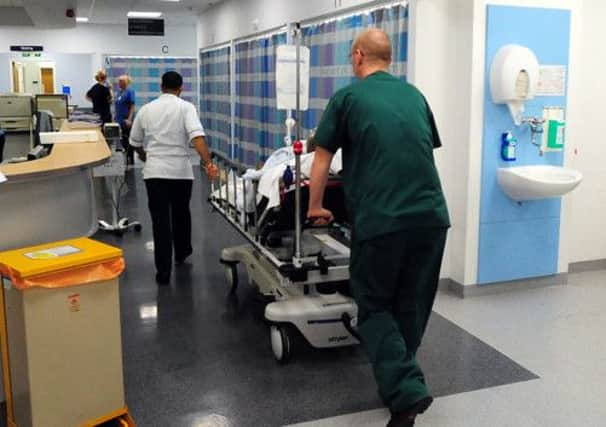Tony Pearson: Privatisation does not lead to better care


It is yet another example of the NHS struggling to meet its basic commitments on the frontline of health provision. That is why Unison and our fellow trade unions are campaigning to end the ongoing privatisation of our health service.
The Health and Social Care Act was deliberately rushed through Parliament and it opened the door wide to privateers and profiteers from every part of the world. The results have been – as the Act’s many critics predicted – chaotic financial management and savage cuts to Government funding, creating a full-blown crisis.
Advertisement
Hide AdAdvertisement
Hide AdOur members devote their lives to caring for others and they see first-hand the stresses on the NHS caused by cuts and consequent job losses. And it is these job losses which are now coming under the scrutiny of the Care Quality Commission (CQC).
In the Mid-Yorkshire NHS Trust, the CQC Inspectors found shortfalls at Pinderfields and Dewsbury and District Hospital “a real concern” and demanded immediate improvements.
Patients were not always getting the care they need, the inspectors found, and urgent action was needed to address staff shortages.
Unison members work throughout the NHS and we are fully aware that it is this chronic under-funding from central government which is the root cause of the perceived failure of parts of the service.
Advertisement
Hide AdAdvertisement
Hide AdIn order to ease the burden on A&E departments, it is necessary to have a properly funded system of community health care. This means we need a network of district nurses who can administer the care needed by elderly and vulnerable patients.
The district nurses are essential to the operation of the whole service. By keeping patients well cared for at home it keeps them away from hospitals, relieving pressure on colleagues.
But the cuts and re-organisations have seen a fall in the numbers of district nurses. For example, phlebotomists, who take blood samples from patients in the community, are increasingly struggling to meet the demands on them because of dwindling numbers of trained staff. For many patients, regular blood tests are vital to monitor their condition and intervene quickly if they reveal clinical problems.
If the NHS is to work as effectively as it should, we must create a fully integrated service where providers of social care for the elderly, community health services, GPs and hospitals are truly co-operative and interdependent.
Advertisement
Hide AdAdvertisement
Hide AdIt is surely sensible to view the service as being holistic in this way. We have all seen the evidence that the fragmentation of services through privatisation leads to a breakdown in communication and a fall in care standards.
At the same time, local authorities face an ever-growing demand for resources to care for an ageing population. Ironically, this increased longevity is the result of 65 years of the NHS improving people’s lives.
But local authorities too are suffering unprecedented cuts to their budgets.
Too many elderly people are at the mercy of under resourced (and often badly trained) agency staff who simply do not have the time to care for them properly. Too many of them have fallen between the two stools of NHS and local authority care.
Advertisement
Hide AdAdvertisement
Hide AdHow in future will we create a better system to care for our elderly people - a stage in life that we will all, hopefully, reach?
Certainly not by the Health Secretary Jeremy Hunt abandoning the duty held by his predecessors to “provide a comprehensive Health Service”. It is a blatant attempt to separate the NHS from the elected Government of the day, and to shirk responsibility for the dire effects of vicious budget cuts.
Meanwhile, the scandal of millions of pounds of taxpayers’ money being siphoned off to pay private consultants for management “advice” to NHS Trusts continues unabated.
The Health and Social Care Act was explicitly designed to allow more privatisation in the dogmatic and ideological belief that markets are inherently efficient.
Advertisement
Hide AdAdvertisement
Hide AdAnyone convinced of that argument might want to consider the following fact: in the USA last year, an estimated 60 per cent of all bankruptcies were the direct result of health care costs which people eventually could not afford.
In the USA, millions of people have no health insurance at all. If wholesale privatisation is allowed to continue, that is where we will end up as well. Markets are not appropriate in essential services like health care precisely because they produce outcomes like the above.
That is why Unison is leading the campaign for the repeal of the Health and Social Care Act. It will destroy the NHS if we allow it to, and the consequences of that are unimaginable.
• Tony Pearson is Unison’s Regional Head of Health in Yorkshire and Humberside.